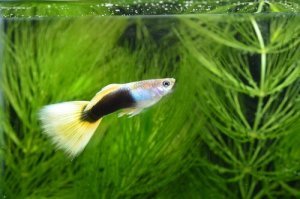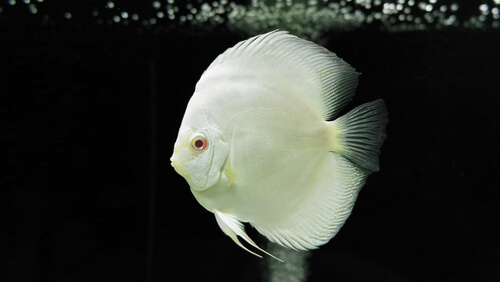
Discus fish are some of the most beautiful tropical species in the world. Their distinctive shape singles them out among a literal sea of aquarium fish. Owning one means being greeted with unique colors and a delightfully vibrant tank every day. Discuses are cichlids and generally peaceful fish. However, their lofty appearance does come with a slight bit of aggressiveness, especially when it’s time to mate.
Now, as an aquarium enthusiast, you must understand that owning a discus fish is like having a colorful prize. Unfortunately, these colors may not remain throughout the lifespan of a fish.
So, you’re not alone if you’re dealing with your discus fish losing color. Many other discus owners have experienced this issue. So, we decided to create this guide to assist anyone that is noticing a discus fish turning black or white.
There are many reasons why this may be happening to your aquatic friend, so we’ll highlight the most probable ones. At the same time, we’ll also offer preventive measures to lower the chances of your discus fish losing color in the future.
Why Your Discus Fish Is Losing Color?
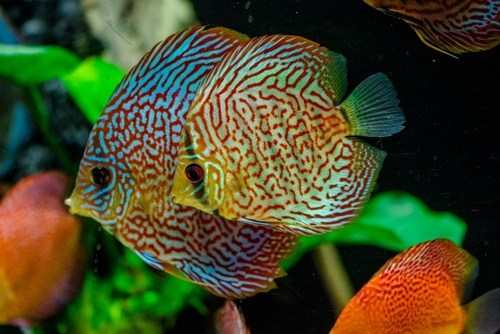
1. Stress
As beautiful as discus are, they aren’t free from the problems that plague every species. Like other animals, discus fish are susceptible to ailments caused by being excessively stressed. Their bright, vibrant patterns can seemingly disappear for a few days, thanks to stress.
A stressful environment also affects the health of a discus, leading to other problems like your discus fish not moving. Seeing these issues arise is not fun to witness. Even worse, not being in control of the situation can make one feel defeated.
Suppose a discus is being kept in a new tank. Know that it will take a little while for the fish to adjust. This feeling of anxiety in discus fish often manifests into a slightly pale appearance. Along with this stress, you’ll find that your discus doesn’t eat much and keeps to itself. Give it a few days to see if it adjusts to the new environment.
Alternatively, add a few things that create private spots for your fish. Aquarium fish enjoy privacy, so consider adding little ornaments to the tank.
2. Diet
Discus fish have their own food preferences and can stop eating if you feed them something they don’t like. Meals high in protein are what they prefer to keep them eating well. If you’re not sticking to a proper diet, you’re bound to have discus fish losing color. Protein-rich foods are great for improving the colors in your discus.
Meals like brine shrimp, mosquito larvae, and white worms are exotic delicacies in the eyes of these vertically superior pets.
While enriching your discus’s diet, you’ll also want to watch out for their consumption of essential vitamins. Keep them fed with meals that contain minerals like calcium and phosphorus. Tiny crustaceans, and adding supplements should do well for them. Throughout the day, you can liven things up for your fish tank by mixing a variety of high-quality meals.
Be wary of overdoing it, though. Unfortunately, discus fish don’t know when to stop, so it’s up to you to decide when they’ve had enough food for the day. A healthy diet is essential to avoid witnessing your discus fish turning black or white. Also, offering diverse food options to encourage healthy growth is generally a good idea.
3. Water Parameters
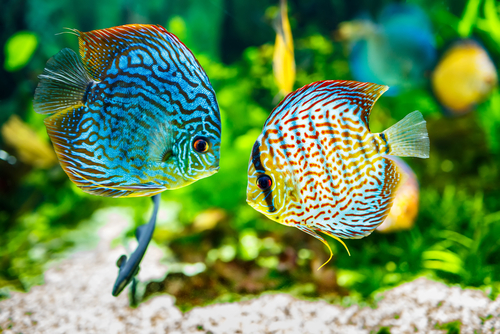
Like other aquarium fish, discus have their own standards on what they can deal with when living in an aquarium. However, their tropical counterparts in the amazon survive in much more challenging water conditions. For domestic discus fish, you must stick to a consistent tank environment. If not, you can begin to spot signs of your discus fish turning black or white after a while.
For these types of fish, you’ll need to stick to a pH level that sits at 6.0-7.0. While watching the pH, the temperature is also essential, with 80-86 degrees Fahrenheit as the ideal level you should target. Once you notice your discus fish losing color, it doesn’t hurt to take a quick look at the tank parameters immediately.
Keeping the water levels consistent also means changing the water regularly and getting rid of any harmful minerals that could be building up within. For example, high nitrate and nitrite levels are pretty dangerous for the fish in your tank.
Unsuitable water parameters in a tank also lead to other symptoms, including your discus fish not moving – a typical sign of extreme lethargy. The best thing to do is initiate regular cleaning for your tank and consistent water changes of at least 30% of the tank water. Installing a thermometer and other similar tools to check tank parameters takes away a good amount of stress.
4. Disease
Many diseases exist that can affect a discus fish. However, Ich is a significant factor in discus fish losing color. Also known as Ichthyopthirius, Ich is easily identified by large white spots on your fish’s body. It’s a Protozoan parasite that attaches itself to your pet. Unfortunately, it’s also highly infectious, so you’ll need to act fast if you notice the white spots so that other fish don’t contract it.
Your first response should be to quarantine for your discus. A fish infected by this disease is an active threat to the entire tank population. Next, look out for signs of your other discus fish not moving, as they may be infected too. You’ll also need to seek advice from an experienced veterinarian.
Besides using the proper treatment, you can also try removing the parasites with tweezers. Although removing parasites yourself is advisable, the depth of their attachment isn’t always easy to spot; nevertheless, it is still good to try. But, again, a vet’s professional help and treatment recommendations should help you get rid of the issue.
5. Age
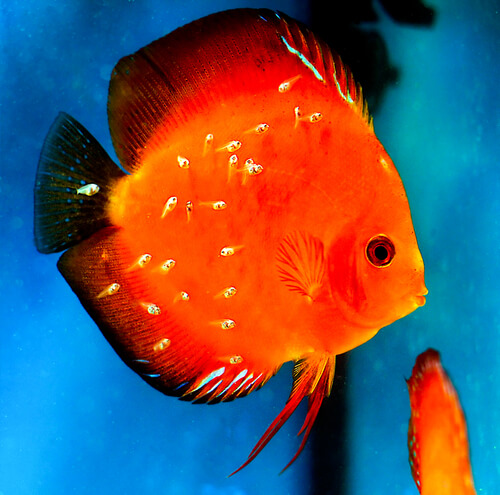
Discus fish tend to survive for a substantially long time. However, living for up to 10 years also comes with the natural effects of aging. In other words, declining health, less movement, an overall decrease in activity, diminishing oxygen intake, and a loss of its vibrant patterns and colors.
One clear sign of aging is your discus fish losing color. While caring for a discus, you’ll need to take particular care with its day-to-day wellbeing, especially concerning diet and tank environment. However, if all the necessary care is in check, you shouldn’t experience discus fish losing color easily.
You can also liven up your old friend’s environment by providing new scenery or activity to boost its energy levels. This is best done by introducing a suitable companion to your tank that will keep your discus fish company. You can also switch up its diet, feed it a new brand of food, or completely switch up the meals. Your discus should be fine if you stick to proper feeding habits and nutrition.
There’s always a chance that your older discus fish can develop symptoms of stress due to the changes in its environment, so you’ll need to introduce these new factors gradually. Also, keep an eye on your fish’s behavior as they age.
They become slower and tend to have smaller appetites due to their body’s degeneration. If these behaviors increase, as well as your discus fish losing color, it could be a sign of your pet being close to the end.
6. Lighting
Discus fish are usually kept in indoor tanks by most aquarium enthusiasts. These tanks are typically well-designed, and even when you follow all the correct guidelines for discus care, there is still a possibility of encountering problems with your discus and its colors. If you’re completely out of ideas on what may be causing the change, you’ll need to look at how much lighting your discus has access to.
Keeping a fish tank under sunlight is extremely dangerous, especially when you’re not constantly around to monitor it. Increased temperatures can threaten its health, leading to problems like your discus fish not moving. Therefore, this isn’t the viable solution for the lighting your discus fish requires.
If you find your discus fish turning black or white, try installing an artificial lighting fixture that provides a consistent illumination source in your tank. This encourages your discus to grow while keeping its vibrant colors in full effect.
How To Enhance Your Discus Fish’s Color?
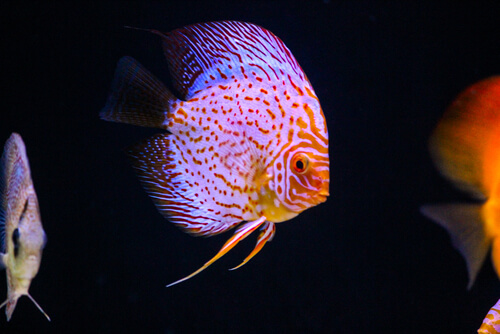
Any owner would want to enhance the colors of their discus, especially when they remember the vibrant appearance it had when they got it at the store. However, while some aquarium enthusiasts leave the loss of color to happen naturally, others may prefer to keep their discus ageless. If you fall into the latter category, there are a few things that you can do for the sake of your discus.
- Food Coloring – Most aquarists opt for this solution when they notice a discus fish losing color. Adding high carotene foods to your fish’s diet is a good start, and you can look towards options like paprika, beet juice, and shrimp. Food choices that contain astaxanthin may induce a vibrant red for your discus. Do note that food coloring may only have a temporary effect on your discus fish. However, if you’re willing to use this method constantly, your discus can live a long, healthy life while eating consistent meals with coloring agents being present. There are no side effects, so this is a valid option.
- Use High-Quality Supplements – When your discus is introduced to strong supplements, it can quickly access essential nutrients for its diet. This helps maintain dietary requirements and helps keep your fish healthy. However, it’s not something you should be doing regularly if your discus already has a balanced diet. Still, if your discus fish is suddenly sporting a dull appearance, it doesn’t hurt to look into this solution.
Final Thoughts
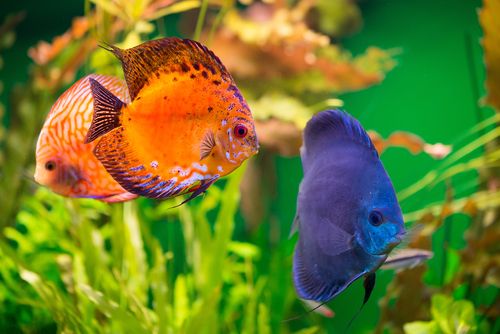
Although they are among the most sensitive types of tropical fish, discus fish are also pretty tough, considering that they can recover from these seemingly life-threatening conditions. However, if you’ve got enough knowledge, you’ll know what to do when encountering a discus fish losing color. This guide helps with that knowledge, bringing you closer to becoming a professional aquarist.




